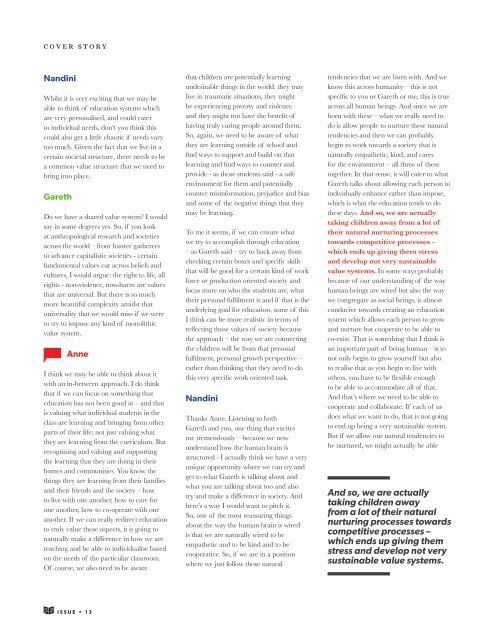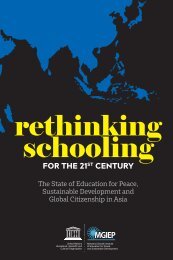The Blue DOT Issue 13
Reimagining Education: Beyond the Rhetoric
Reimagining Education: Beyond the Rhetoric
You also want an ePaper? Increase the reach of your titles
YUMPU automatically turns print PDFs into web optimized ePapers that Google loves.
COVER STORY<br />
Nandini<br />
Whilst it is very exciting that we may be<br />
able to think of education systems which<br />
are very personalised, and could cater<br />
to individual needs, don’t you think this<br />
could also get a little chaotic if needs vary<br />
too much. Given the fact that we live in a<br />
certain societal structure, there needs to be<br />
a common value structure that we need to<br />
bring into place.<br />
Gareth<br />
Do we have a shared value system? I would<br />
say in some degrees yes. So, if you look<br />
at anthropological research and societies<br />
across the world – from hunter gatherers<br />
to advance capitalistic societies - certain<br />
fundamental values cut across beliefs and<br />
cultures, I would argue: the right to life, all<br />
rights - non-violence, non-harm are values<br />
that are universal. But there is so much<br />
more beautiful complexity amidst that<br />
universality that we would miss if we were<br />
to try to impose any kind of monolithic<br />
value system.<br />
Anne<br />
I think we may be able to think about it<br />
with an in-between approach. I do think<br />
that if we can focus on something that<br />
education has not been good at – and that<br />
is valuing what individual students in the<br />
class are learning and bringing from other<br />
parts of their life; not just valuing what<br />
they are learning from the curriculum. But<br />
recognising and valuing and supporting<br />
the learning that they are doing in their<br />
homes and communities. You know the<br />
things they are learning from their families<br />
and their friends and the society – how<br />
to live with one another, how to care for<br />
one another, how to co-operate with one<br />
another. If we can really redirect education<br />
to truly value those aspects, it is going to<br />
naturally make a difference in how we are<br />
teaching and be able to individualise based<br />
on the needs of the particular classroom.<br />
Of course, we also need to be aware<br />
that children are potentially learning<br />
undesirable things in the world: they may<br />
live in traumatic situations, they might<br />
be experiencing poverty and violence<br />
and they might not have the benefit of<br />
having truly caring people around them.<br />
So, again, we need to be aware of what<br />
they are learning outside of school and<br />
find ways to support and build on that<br />
learning and find ways to counter and<br />
provide - as those students said - a safe<br />
environment for them and potentially<br />
counter misinformation, prejudice and bias<br />
and some of the negative things that they<br />
may be learning.<br />
To me it seems, if we can ensure what<br />
we try to accomplish through education<br />
– as Gareth said – try to back away from<br />
checking certain boxes and specific skills<br />
that will be good for a certain kind of work<br />
force or production oriented society and<br />
focus more on who the students are, what<br />
their personal fulfilment is and if that is the<br />
underlying goal for education, some of this<br />
I think can be more realistic in terms of<br />
reflecting those values of society because<br />
the approach – the way we are connecting<br />
the children will be from that personal<br />
fulfilment, personal growth perspective –<br />
rather than thinking that they need to do<br />
this very specific work oriented task.<br />
Nandini<br />
Thanks Anne. Listening to both<br />
Gareth and you, one thing that excites<br />
me tremendously – because we now<br />
understand how the human brain is<br />
structured - I actually think we have a very<br />
unique opportunity where we can try and<br />
get to what Gareth is talking about and<br />
what you are talking about too and also<br />
try and make a difference in society. And<br />
here’s a way I would want to pitch it.<br />
So, one of the most reassuring things<br />
about the way the human brain is wired<br />
is that we are naturally wired to be<br />
empathetic and to be kind and to be<br />
cooperative. So, if we are in a position<br />
where we just follow those natural<br />
tendencies that we are born with. And we<br />
know this across humanity – this is not<br />
specific to you or Gareth or me, this is true<br />
across all human beings. And since we are<br />
born with these – what we really need to<br />
do is allow people to nurture these natural<br />
tendencies and then we can probably<br />
begin to work towards a society that is<br />
naturally empathetic, kind, and cares<br />
for the environment – all three of these<br />
together. In that sense, it will cater to what<br />
Gareth talks about allowing each person to<br />
individually enhance rather than impose,<br />
which is what the education tends to do<br />
these days. And so, we are actually<br />
taking children away from a lot of<br />
their natural nurturing processes<br />
towards competitive processes –<br />
which ends up giving them stress<br />
and develop not very sustainable<br />
value systems. In some ways probably<br />
because of our understanding of the way<br />
human beings are wired but also the way<br />
we congregate as social beings, is almost<br />
conducive towards creating an education<br />
system which allows each person to grow<br />
and nurture but cooperate to be able to<br />
co-exist. That is something that I think is<br />
an important part of being human – is to<br />
not only begin to grow yourself but also<br />
to realise that as you begin to live with<br />
others, you have to be flexible enough<br />
to be able to accommodate all of that.<br />
And that’s where we need to be able to<br />
cooperate and collaborate. If each of us<br />
does what we want to do, that is not going<br />
to end up being a very sustainable system.<br />
But if we allow our natural tendencies to<br />
be nurtured, we might actually be able<br />
And so, we are actually<br />
taking children away<br />
from a lot of their natural<br />
nurturing processes towards<br />
competitive processes –<br />
which ends up giving them<br />
stress and develop not very<br />
sustainable value systems.<br />
to arrive to an organised system, which is essentially sustainable,<br />
nurturing and empathetic yet allows us to be good versions of<br />
ourselves.<br />
We have now the biology and the science to support it. If anything,<br />
I think it is now a good time to try to find ways that might happen.<br />
Is that something that either of you may be willing to buy into?<br />
Anne<br />
An interesting thought popped into my mind when we were talking,<br />
Nandini. Because I completely agree with what you are talking<br />
about but you are talking about from the perspective of how the<br />
student will best learn. But if you apply the same definition to<br />
education itself and think of it as an entity that could be supported<br />
in terms of a cooperative entity and an empathetic entity – may be<br />
that’s a direction that will help us reimagine education for the better.<br />
Because I know that a lot of the really impressive innovations that<br />
I have read about, have to do with schools and education systems<br />
that are partnering with places in their community that the schools<br />
themselves have a deep connection with and are working to do<br />
good – not just for how they teach – but also to make their broader<br />
community a better place. And they bring community development<br />
in and they support parents and families that need help. But they<br />
also have close connections with society, businesses and so the<br />
school itself becomes a caring, communicative, cooperative entity<br />
– that provides and easier template to be able to communicate and<br />
support those same strengths in the students that they are working<br />
to teach.<br />
Nandini<br />
Gareth, I’m wondering what Anne talked about very nicely lends<br />
itself into already broadening the idea a school actually going<br />
into what we might want to start calling learning spaces. So, we<br />
begin to broaden our ideas about education and learning<br />
is something that is not just happening in school but in<br />
a learning space and a learning space might combine<br />
and consist of multiple structures – ideally, it is the world,<br />
because you are learning all the time. But if one had to include<br />
the communities, environments, businesses – all of these become<br />
learning spaces so learning in education is happening all the time.<br />
Do you think this is something that we can begin to think about<br />
as we get into this discussion and not just think of that learning is<br />
happening in schools?<br />
Gareth<br />
<strong>The</strong> idea that we need to see that learning as happening not only<br />
in schools. Of course, it is absurd. Where do kids learn most<br />
– they learn through play and they learn through the internet<br />
unfortunately. I think Anne made a really good point earlier about<br />
the nature or the environment that we have. Kids are literally<br />
learning all the time. Are they learning things that are worthwhile<br />
to be learnt is the question? I think the best argument against<br />
personalisation is kids don’t know what they don’t know. <strong>The</strong>y<br />
are just kids. <strong>The</strong>y don’t yet know all the horrible things out there<br />
and some of the awful things out there seem cool and they seem<br />
fun – and they really engage their drives and desires in ways that<br />
are really damaging. I don’t think humans are solely empathetic<br />
and loving and caring – I think we are all sorts of things. I think<br />
we act badly in all sorts of ways. But the question is why? And I<br />
think it is because we are damaged. We are traumatised. And we<br />
COVER STORY<br />
ISSUE • <strong>13</strong><br />
4 7

















